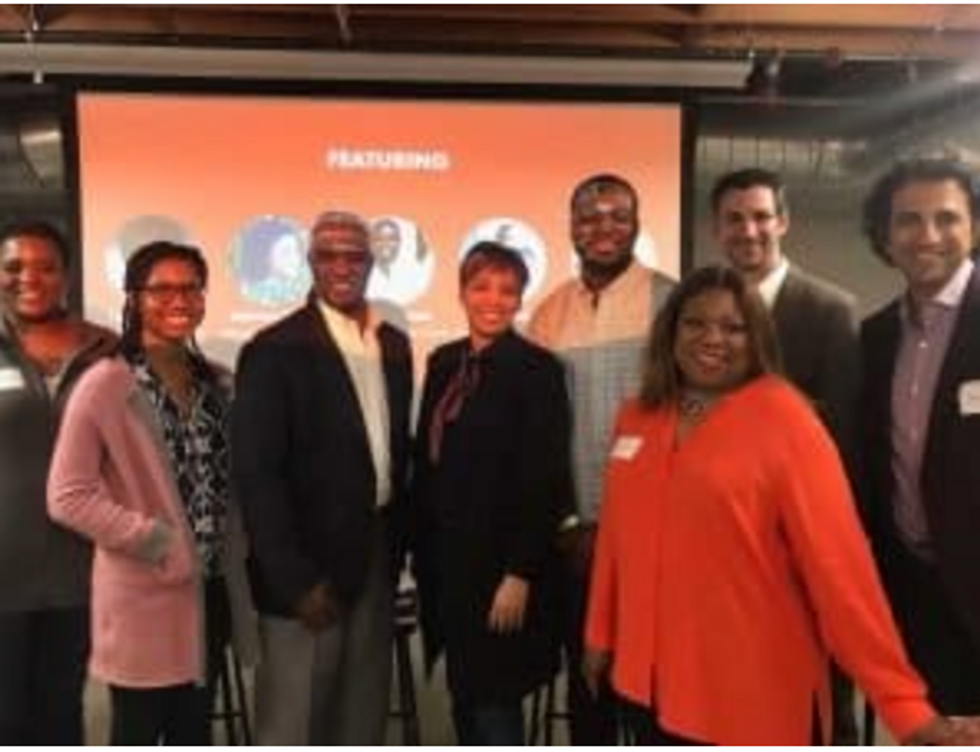Below is an article originally written by Portia Kibble Smith, Head of Diversity, Equity & Inclusion, Karat and published on March 2nd, 2021. Go to Karat's company page on PowerToFly to see their open positions and learn more.
Brilliant Black Minds unlocks opportunities for Black software engineers
At Karat we believe interviews unlock opportunities and change lives.
Today's tech companies are creating the future. Every time a developer gets a job, they create a new opportunity for their company to create, grow, and innovate. And every time a developer gets a job it's an opportunity for them to build the lasting financial stability and economic empowerment that comes with a high-paying career.
The tech industry is the biggest opportunity generator of our lifetime.
And yet, those opportunities are not distributed equitably. Black software engineers have been mostly kept out of the highest levels of tech. Most people who look like me simply don't have access to the opportunities or networks that come with a career in tech.
When I first started working with Karat's co-founders, Mohit Bhende and Jeffrey Spector, we were on a mission to make interviews predictive, fair, and enjoyable. Part of that involved building a startup with DEI at its core, so I joined them (and occasionally pushed them) throughout the journey.
Early in Karat's startup life, we conducted primary research to understand the problem that Karat was solving from the candidate's perspective. We toured community colleges and Historically Black Colleges and Universities (HBCUs) to interview students about their job searches.
In most of our focus groups, we'd hear similar stories. There was a common theme, especially among first-generation college students, around needing to pick between security and their dreams. "We don't have the luxury to fail," said one student.
Compounding the problem, most of the students we met with didn't know that a technical interview was different from a behavioral interview. Without access to people who worked in tech, they didn't understand the process. They didn't have a way in without risking failure in an unfamiliar world.
Today, Karat launched Brilliant Black Minds, our flagship purpose program. Brilliant Black Minds honors the heritage of genius and brilliance in the Black community while removing barriers to the information, networks, and resources Black engineers need to ascend to the highest heights of tech.
Sabrina Williams, Uchenna Okoye, Forest Harper, Angela Roseboro, Wahab Owolabi, Portia Kibble Smith, Jeffrey Spector, and Mohit Bhende after the first Real Talk panel
Bringing this program to life has been an incredible journey at both the programmatic and personal level. Karat has innovated and created new interview content to meet the needs of our candidates. We've worked with great companies like Intuit and Databricks to help diversify their engineering teams and make recruiting more inclusive. We've shared interviewing tips and best practices with members of the National Society of Black Engineers, offered workshops on negotiation and resume building, and elevated the voices of Black engineering and HR leaders with forums like Real Talk: Diversity in Tech.
And we interviewed! We interviewed a lot, actually! Karat has conducted over 80,000 technical interviews on behalf of some of the world's biggest tech companies, and we have also delivered thousands of practice interviews.
What is the Brilliant Black Minds program?
Last spring, Karat shared our commitment to the Black community. As part of that commitment, we promised to deliver $1M in practice interviews to Black software engineers, to focus R&D on new, more inclusive technical interview formats that broaden the criteria used to make hiring decisions, and to ensure that Karat as a company is inclusive of all our employees' identities and points of view.
More than three-quarters of the Sophomore, Junior, and Senior students in Howard University's computer science program participated in our Brilliant Black Minds interview series last quarter. This is no small feat considering the students were all juggling the demands of school, adapting to learning virtually, and navigating the pandemic which has impacted the Black community disproportionately.
Participants receive a series of virtual technical interviews just like the ones they will encounter throughout their careers. After each interview, participants received feedback from professional Interview Engineers about their strengths and areas for improvement. Participants also had the opportunity to measure their improvement over the course of the series, which kicked off in the middle of last fall's peak University Recruiting season–the busiest time of year for companies hiring interns and new grads.
These practice interviews helped participants build confidence and hone their technical interviewing skills and ultimately get full-time jobs and summer internships. What's been most incredible is seeing the progression of having participants go from asking us for interview tips, to asking for salary negotiation tips as they weigh the offers that are pouring in!
Why Brilliant Black Minds?
Black students have long faced an access gap within education. Over 7 million children in the U.S. live in households without a computer—including over 1.8 million Black children. In addition, nearly a third of Black households don't have high speed internet.
Despite these challenges, there is no shortage of Black brilliance in the world, only a shortage of some people's ability to see it. Last fall as we were kicking off our work at Howard University, the University's president wrote a passionate op-ed for CNN reinforcing the limitless pool of Black talent because where we see brilliance others see a "pipeline problem."
Brilliant Black Minds aims to help bridge those gaps. Karat is giving Black software engineers first-hand interview experience, performance feedback, and professional development. And Karat is also illuminating the brilliance of our participants for the tech industry to witness and recognize.
"Being able to work with the people who directly make these questions and then get feedback and know that it's not people that are judging you, but here to just help you and make sure that when you get to the next step of the interview process, you know exactly what to do has just been so beneficial to me." – Demetria Mack, Howard University, class of 2023
Brilliant Black Minds today
It's been incredible to meet and mentor many of these actual brilliant Black minds, and feedback like this quote from one of our Fall 2020 participants lets me know we're heading in the right direction.
"The interview was really helpful for me because last semester I was going through technical interviews. I wasn't as confident in speaking to my thought process and that's one thing the program helped me build. I felt more confident going into the real interviews." – Shondace Thomas, Howard University, class of 2021
This is why I'm here at Karat doing this work, and that's why today's official announcement is so personal for me.
In addition to creating a new content series and set of questions for the four interviews we're offering students at Howard this semester, we're also opening up the program to all computer science students at Morehouse College, an HBCU in Atlanta, and we are working with our first industry partner, Jopwell, to extend invitations to professional software engineers as well.
The long-term impact of Brilliant Black Minds
In addition to supporting today's Black engineers, we're taking a long-term look at hiring in tech.
All those years ago, when Jeff, Mo, and I first sat down with students at Howard, we heard how the lack of familiarity with the process of getting hired in tech was a barrier.
People with a cousin who works at Google or a parent at Amazon have immediate access to how the job search process works. They know what's expected and how to prepare and what to do on their first day of a new job. For many Black engineer students who are the first in their family to go to college or pursue a career in tech, this is not the case.
We're working with our partners at the department of computer science at Howard University to anonymize participant data from the practice interviews and produce insights that will change the way the interview process works for the better. These insights are already highlighting places where the curriculum that students are learning doesn't match industry expectations for the skills that we assess during internship and new-grad interviews.
Karat unlocks opportunity
Karat has grown so much since those initial HBCU focus groups. I'm proud to say that in addition to making the individual interviews more predictive, fair, and enjoyable, we're now able to open some of those closed doors and help the industry see the brilliance coming from the Black engineers we serve.
Our mission and purpose at Karat are more important today than ever. The Brilliant Black Minds program is going to have an incredible impact, not just for the Black community but for society as a whole. Tech is shaping the way we live today and the way we will live in the future. It is imperative that the people who have the opportunities to code our future represent all of us.
To learn how to get involved with Brilliant Black Minds, email: Brilliant_Black_Minds [at] karat [dot] com




